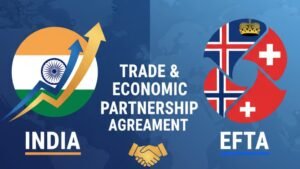The India–EFTA Trade & Economic Partnership Agreement
|
General Studies Paper II: Bilateral Groupings & Agreements, International Treaties & Agreements |
Why in News?
The Trade and Economic Partnership Agreement (TEPA) between India and the European Free Trade Association (EFTA) came into force on 1 October 2025, representing a modern and forward-looking Free Trade Agreement (FTA) of India.
What is the The Trade and Economic Partnership Agreement (TEPA)?
- The Trade and Economic Partnership Agreement (TEPA) is a landmark deal between India and the European Free Trade Association (EFTA), which includes Switzerland, Norway, Iceland, and Liechtenstein. This agreement marks India’s first comprehensive FTA with these four European nations.
- It was officially signed on 10th March 2024 in New Delhi after over two decades of negotiations, spanning 21 rounds since 2008.
- TEPA is designed as a modern and ambitious framework, focusing not only on trade but also on investments and employment opportunities.
- The aim of TEPA is to enhance trade and economic cooperation between India and EFTA countries.
- The agreement seeks to reduce tariffs and non-tariff barriers, making it easier for businesses from both sides to operate efficiently.
- It also strives to ensure fair and predictable market access for investors and service providers.
- TEPA also strengthens intellectual property rights (IPR) protections for innovators and creators. It ensures that patents, trademarks, and copyrights are recognized and protected under international standards.
Key Features of the India–EFTA Trade and Economic Partnership Agreement (TEPA)
- Investment: TEPA will include a binding commitment of USD 100 billion in foreign direct investment (FDI) into India over 15 years. EFTA countries will aim to facilitate the creation of 1 million direct jobs in India during this period. These investments will focus on long-term productive capacity building and exclude foreign portfolio investments.
- Market Access: Under TEPA, EFTA will provide tariff concessions on 92.2% of tariff lines, covering nearly 99.6% of India’s exports. This includes 100% of non-agricultural products and processed agricultural products (PAP). India will also open 82.7% of its tariff lines, covering 95.3% of EFTA exports, with sensitive sectors such as pharmaceuticals, medical devices, processed food, dairy, soya, and coal protected.
- Professional Mobility: TEPA will enhance India’s services exports in IT, business services, education, cultural services, and audio-visual sectors. The agreement will enable Mutual Recognition Agreements (MRAs) for professional services like nursing, chartered accountancy, and architecture. Services access will improve through digital delivery (Mode 1), commercial presence (Mode 3), and temporary stay of key personnel (Mode 4).
- Intellectual Property Rights (IPR): TEPA will strengthen IPR protections at TRIPS levels. Switzerland, in particular, will provide a high standard IPR regime under the agreement. India will safeguard its interests in generic medicines and address concerns related to the evergreening of patents.
- Sustainable Development: The agreement will promote sustainable development, inclusive growth, and environmental protection. TEPA will improve transparency, simplify trade procedures, and harmonize standards between India and EFTA nations.
- Technology Collaboration: TEPA will accelerate job creation for India’s young workforce in the next 15 years. It will enhance vocational and technical training opportunities. The agreement will also facilitate technology collaboration in fields like precision engineering, renewable energy, health sciences, innovation, and R&D, helping India access global expertise and advanced technologies.
- Agriculture Products: India’s agricultural exports to EFTA will benefit significantly. Guar gum, basmati rice, pulses, fresh fruits, cereal preparations, and processed vegetables will gain improved market access. Norway and Switzerland will remain key markets, contributing over 99% of India’s agricultural exports to EFTA. TEPA will eliminate tariffs and expand opportunities for high-demand products like mangoes, grapes, cashew kernels, and millets.
- Processed Foods: TEPA will enhance exports of processed foods such as biscuits, confectionery, chocolate, sauces, and malt extracts. Tariff elimination and trade facilitation will boost India’s competitiveness in EFTA markets. Countries like Switzerland, Norway, and Iceland will offer duty-free or reduced tariffs.
- Marine Products: TEPA will provide India tariff-free access to marine products in EFTA countries. Norway will allow exemption up to 13.16% on fish and shrimp feed. Iceland will reduce tariffs on frozen shrimps, prawns, squid, and cuttlefish by up to 55%. Switzerland will eliminate duties on fish oils.
- Textiles: India’s textiles and apparel exports to EFTA will gain new growth opportunities. Leather and footwear will continue enjoying 0% MFN tariffs. TEPA will ensure long-term stability for exporters.
- Electronics & Chemicals: TEPA will support India’s engineering goods exports, especially electric machinery, aluminum products, and precision engineering items. Electronics exports, including medical devices, EV components, smart sensors, and embedded systems, will benefit from preferential market access. Chemicals will face zero or reduced tariffs on over 95% of exports.
- Gems & Jewellery: Gems and jewellery will retain duty-free access in EFTA markets. Switzerland, Norway, and Iceland will provide opportunities for gold, silver, cut and polished diamonds, rubies, and imitation jewellery. TEPA will help India consolidate its market position and expand exports in high-value jewellery segments.
- Investment Facilitation: A dedicated India–EFTA Desk will act as a single-window mechanism for investment promotion. It will support joint ventures, SME collaborations, technology partnerships, and regulatory guidance. The desk will focus on sectors like renewable energy, life sciences, engineering, and digital transformation.
|
European Free Trade Association (EFTA)
|
Bilateral Trade Relationship Between India and EFTA
- Bilateral Trade: In the fiscal year 2024–25, India’s total trade with the European Free Trade Association (EFTA) countries was valued at $24.4 billion. India’s exports to EFTA amounted to $1.96 billion, while imports stood at $22.45 billion, primarily driven by gold imports from Switzerland.
- Export Sectors: India’s exports to EFTA encompass several sectors:
-
- Engineering Goods: In FY 2024–25, India’s engineering exports to EFTA reached $315.2 million, marking an 18% growth over the previous fiscal year. Norway and Switzerland remain the largest destinations, accounting for almost 99% of total exports.
- Textiles and Clothing: India exported $130 million worth of textiles and clothing to EFTA in 2024. Compared to India’s total global exports of $36.71 billion, the EFTA market still has room to grow.
- Tea: The EFTA tea market is about 3 million kilograms. After TEPA, the average price for Indian tea exports has gone up, from $5.93/kg in 2023–24 to $6.77/kg in 2024–25.
Challenges in India-EFTA Trade Relations
-
- Trade Imbalance: India has a trade deficit with EFTA countries. Imports, especially gold from Switzerland, exceed India’s exports. This imbalance limits the economic benefits for Indian businesses.
- Market Access: Certain sensitive sectors like pharmaceuticals, dairy, and medical devices face limited market access. Tariff barriers and regulatory restrictions still exist. These restrictions prevent India from fully exploiting EFTA’s high-value markets.
- Regulatory Hurdles: Although TEPA opens opportunities in services, regulatory hurdles still limit Indian professionals. Mutual Recognition Agreements (MRAs) are not yet fully implemented. This affects sectors like nursing, chartered accountancy, and architecture.
- Technology Gaps: India needs more technology collaboration and foreign investment in high-tech sectors. EFTA investments are concentrated in certain industries, leaving gaps in others like renewable energy and precision engineering.
|
What is the Free Trade Agreement (FTA)?
|
|
Also Read: India-UK Free Trade Agreement |









